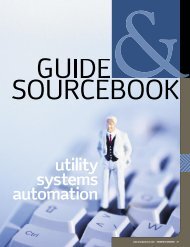FERC vs NERC: A grid control showdown over cyber security
FERC vs NERC: A grid control showdown over cyber security
FERC vs NERC: A grid control showdown over cyber security
You also want an ePaper? Increase the reach of your titles
YUMPU automatically turns print PDFs into web optimized ePapers that Google loves.
TRANSMISSIONS<br />
WWW.INTELLIGENTUTILITY.COM /// JULY/AUGUST 2011<br />
8<br />
www.intelligentutility.com /// may/June 2011<br />
the <strong>grid</strong>, this approach would enable<br />
exception-based management<br />
by dispatchers.<br />
With a shift to a bottom-up, edgebased<br />
<strong>control</strong> paradigm, potential<br />
solutions become more feasible,<br />
because now they better match the<br />
problem. The key to managing an<br />
incredibly data-rich <strong>grid</strong> will be<br />
opening up to new players and<br />
Smart Grid<br />
2020<br />
Where are we going?<br />
We decided to plumb the depths of our own crystal ball,<br />
and asked analysts, researchers and national laboratory leaders<br />
where they think the industry is headed in the coming<br />
Gazing into<br />
decade, and what we can expect come 2020.<br />
data analytics on the rise<br />
the future of<br />
In early January, Pike Research released data indicating that<br />
the software and services that will enable smart <strong>grid</strong> data<br />
the new utility<br />
analytics will represent one of the largest growth opportunities<br />
in the utility sector <strong>over</strong> the next few years, increasing<br />
+ Some elements are<br />
from a relatively small market of $356 million last year to<br />
more hazy than others<br />
nearly $4.2 billion in annual revenue by 2015.<br />
By Kate Rowland<br />
And there are clear indicators this trend will continue into<br />
2020. “Data analysis is the area which is just emerging as a<br />
It’S generally agreed that the comIng need: ‘Okay, I now have the systems in place and have lots<br />
decade will bring more change to our industry of data, but what do I do with it?’” said John Wambaugh, a<br />
than we’ve seen in the previous century.<br />
vice president of Utility Integration Solutions (UISOL). “My<br />
Industry researchers have clearly indicated they see a favorite quote is, ‘I have 100 times more data, and I still can’t<br />
massive increase in smart <strong>grid</strong> spending between now and tell where the problem is.’”<br />
2015. Late last year, SBI Energy was definitive in its expec- In my own conversations with utilities and vendors<br />
tion that “The next five years will be a pivotal period for the alike, especially <strong>over</strong> the past year, the subject of struc-<br />
global smart <strong>grid</strong> market, with <strong>grid</strong> component companies tured and unstructured data analytics has crept into<br />
expected to leverage their sales prowess to capture long-term the discussions more and more often. As Craig Johnston,<br />
contracts throughout the electric <strong>grid</strong> supply chain.” OGE Energy Corp.’s vice president, corporate strategy<br />
But what about 2020?<br />
and marketing, told us recently about his utility’s data<br />
16<br />
new possibilities, letting go of some<br />
elements of <strong>control</strong> and changing the<br />
paradigm. Managing data as it comes<br />
into the system, out at the edge, for<br />
example, reduces the data that must<br />
be carried <strong>over</strong> the communication<br />
system. Intelligent edge devices as<br />
well are needed to substitute for<br />
better equipped dispatchers.<br />
John Cooper<br />
Ecomergence<br />
I agree with Dr. Harris that more <strong>grid</strong>level<br />
data needs to be made available.<br />
I also agree with him that knowing<br />
the state of the <strong>grid</strong> is more valuable<br />
than estimates of the state of the <strong>grid</strong><br />
(hence the term “state estimator”).<br />
However, I’m not as sanguine about<br />
the prospects for “perfection” and<br />
“optimality” in a smarter <strong>grid</strong> with<br />
more actors. Dispatchers, and dispatch<br />
algorithms, face limitations on computing<br />
power and the availability of<br />
information. Consumers are not going<br />
to sit quietly while a faceless individual<br />
in Valley Forge decides when their air<br />
conditioner can run, and when dinner<br />
IlluStratIon by dana lechtenberg<br />
needs to be put off for the sake of<br />
economic efficiency.<br />
If we’re really serious about engaging<br />
consumers in this <strong>grid</strong> modernization<br />
effort we call the “smart <strong>grid</strong>,”<br />
then consumers have to be in charge,<br />
not the dispatchers. Rather than exercising<br />
<strong>control</strong> <strong>over</strong> the <strong>grid</strong>, dispatchers<br />
monitor the <strong>grid</strong>, signal when the<br />
<strong>grid</strong> is out of balance, and only step<br />
in when automation<br />
on the edge of the <strong>grid</strong><br />
can’t or won’t keep the<br />
<strong>grid</strong> from collapsing.<br />
I think some policymakers<br />
are very serious<br />
about engaging<br />
consumers, but they<br />
have no idea what’s<br />
required and what the<br />
ramifications are.<br />
www.intelligentutility.com 17<br />
Jack Ellis<br />
Tahoe City, CA<br />
Smart meter<br />
manufacturers join forces<br />
Intelligent Utility Daily, June 21<br />
I find the need for the smart meter<br />
manufacturers association both<br />
interesting and sad.<br />
I am speaking from personal firsthand<br />
experience and interaction with<br />
several of the smart meter manufacturers<br />
who have created this association.<br />
I have had extensive personal<br />
experience with different utilities from<br />
across the nation involving smart<br />
meter uses and deployments. I fully<br />
understand the needs of the manufacturers<br />
in undertaking such efforts to<br />
protect their bottom line. After all, this<br />
is their business and, as stated in the<br />
article, some have been in the business<br />
for 100 years or more. The manufacturers<br />
have maintained a product<br />
reliability record that can be easily<br />
verified and defended with astonishing<br />
results. This too is pointed out by the<br />
reports given in the article.<br />
The sadness I feel is <strong>over</strong> the lack of<br />
“clear” utility leadership in the efforts.<br />
I believe the bottom-line reason for<br />
the consumer pushback is not because<br />
of smart meters per se, but more<br />
about consumer frustration and lack<br />
of voice. The smart meters are just the<br />
newest lightning rod attracting the<br />
pent-up anger/energy of the consumers.<br />
Utilities have done a very poor<br />
job of presenting consumer benefit<br />
cases to the public, and the consumers<br />
know that they will be charged for the<br />
deployment of these new technologies<br />
with questionable benefits for themselves.<br />
The utilities will be the ones<br />
who gain the greater benefits if the<br />
present business cases are used.<br />
The failure of utilities to understand<br />
Marketing 101 and build products that<br />
people want and are willing to pay for,<br />
I believe, is the root of the problem. It<br />
is not the smart meter that has failed,<br />
but the utility business cases presented<br />
to consumer with thinly veiled<br />
consumer benefit packages. These<br />
packages are being quickly disrobed,<br />
by the consumers themselves I might<br />
add, as another effort to raise rates and<br />
increase utility revenue.<br />
I applaud the smart meter manufacturers<br />
for trying to step in as responsible<br />
players. Their main problem is<br />
that the real players are still sitting<br />
in the stands watching the game.<br />
Unfortunately for them (the utilities),<br />
they do not fully realize the changing<br />
game rules, nor do they see the new<br />
players standing in the wings ready to<br />
run onto the field. Most of the existing<br />
utility players will not be around in the<br />
near future, and the changes will come<br />
fast and furious.<br />
Richard G. Pate<br />
Pate & Associates<br />
To contribute to the<br />
Transmissions department,<br />
please e-mail your submission to<br />
intelligentutility.editor@energycentral.<br />
com. Provide your name, address and<br />
daytime phone number. Letters may be<br />
edited for style and space.


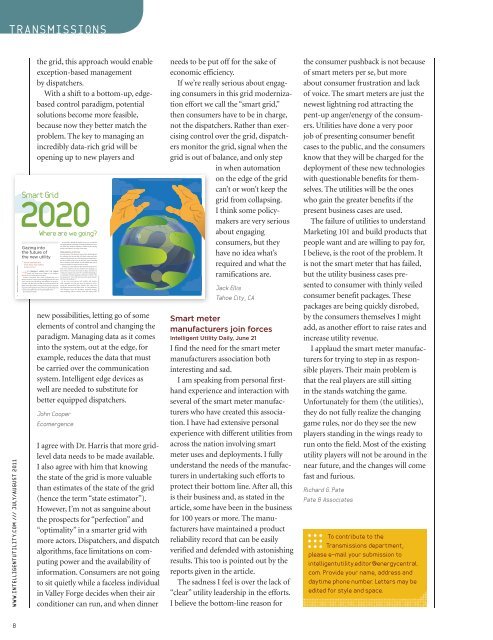
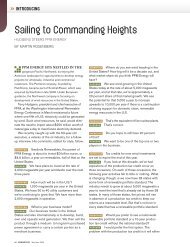

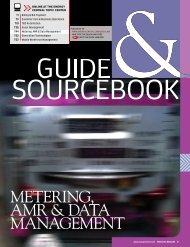



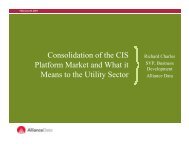

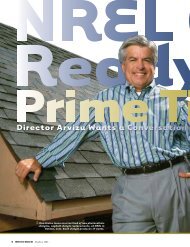


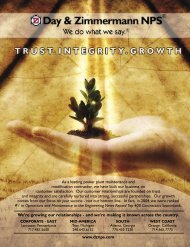
![View From the Trenches [PDF]](https://img.yumpu.com/18854438/1/190x252/view-from-the-trenches-pdf.jpg?quality=85)
